Mito
Member
- Joined
- Dec 10, 2016
- Messages
- 2,554
I think @tyw came to the same conclusion about DHA Tyw. Said Something That Makes Alot Of Sense!.I am still convinced that we need either DHA or α-linolenic acid (18∶3ω−3).
Docosahexaenoic Acid (DHA)
Follow along with the video below to see how to install our site as a web app on your home screen.
Note: This feature may not be available in some browsers.
Click Here if you want to upgrade your account
If you were able to post but cannot do so now, send an email to admin at raypeatforum dot com and include your username and we will fix that right up for you.
I think @tyw came to the same conclusion about DHA Tyw. Said Something That Makes Alot Of Sense!.I am still convinced that we need either DHA or α-linolenic acid (18∶3ω−3).
I think there is something to what you are highlighting. Sometimes I have an inner draw/desire for foods with more DHA like eggs, oysters, halibut, even caviar especially after a long stretch without eating them. My diet is fairly steady and simple. When I feel an urge, I pay attention.My favourite think about Ray Peat has been his wit and writing style, but I owe him a debt of gratitude for calling attention to ω−6 fatty acids. However, I do feel that he concentrates a bit too much on polyunsaturated fatty acids in general instead of the more dangerous prostaglandin E₂/E₁ precursors. Although lipofuscin is interesting, and a good reason to avoid iron, I am still convinced that we need either DHA or α-linolenic acid (18∶3ω−3). I don't think a mammalian brain has even been found with-
out high levels of DHA, and the instances in which it's found deficient are always accompanied by pathology. Nonetheless, coconut oil is still the best oil and the only polyunsaturated fatty acid we do need are small amounts of α-linolenic acid (or DHA)—unless someone discovers that we actually can make this de novo from stearate or something. The term 'essential fatty acid' when applied to linoleic acid (18∶2ω−6) is still a misonomer, and Mead acid is of course preferred instead of arachidonate.
It could be coincidental. Disgust and humor are different responses to the same phenomena, and our society can provoke either.
Analytically, the most rational solution to the current system would be civil war or suicide, and you see both: the growth of radical domestic politics (nationalism, particularly ethnic nationalism, as well as populism) and the skyrocketing rates of depression and suicide, particularly for white males:
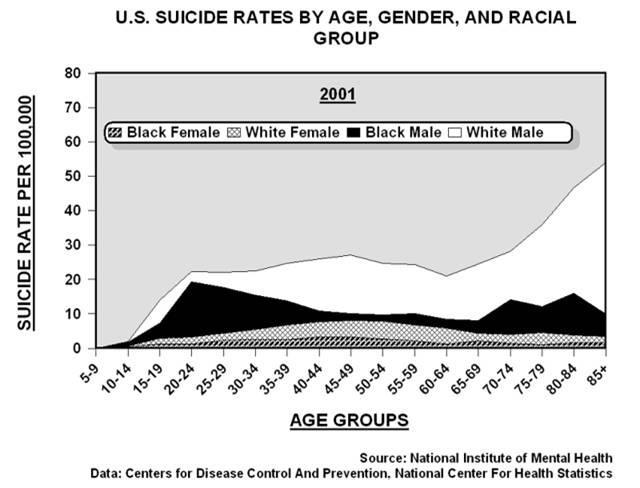
Alternatively, one could drug themselves to resist the anomic environment, itself a common phenomenon as well, namely opioids to numb the pain:
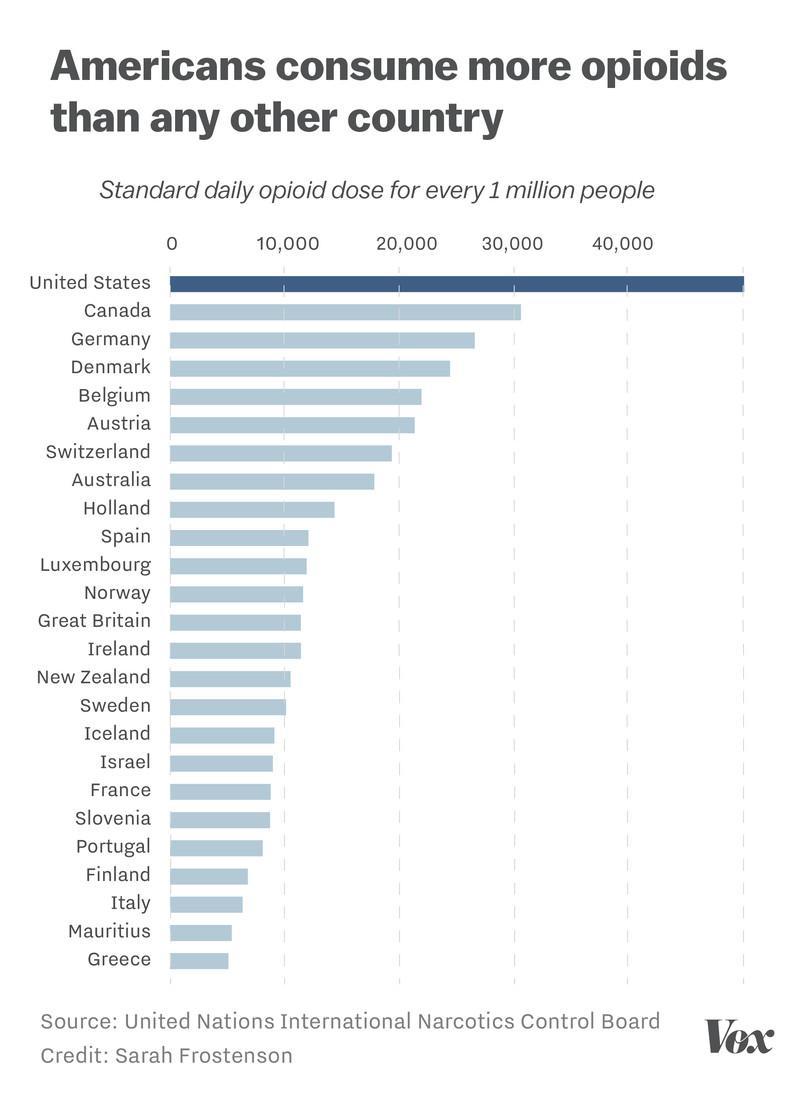
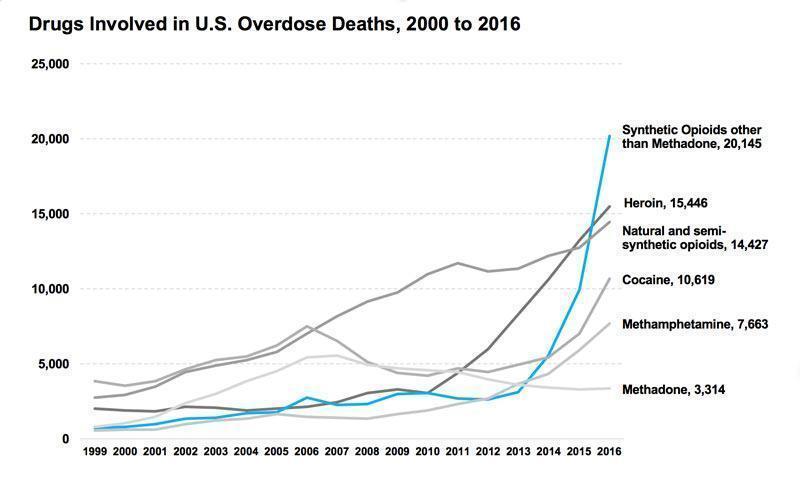
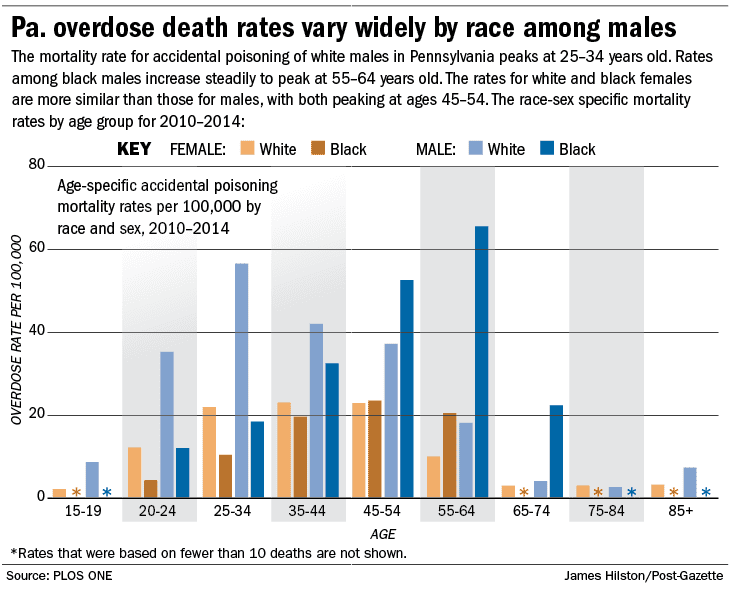
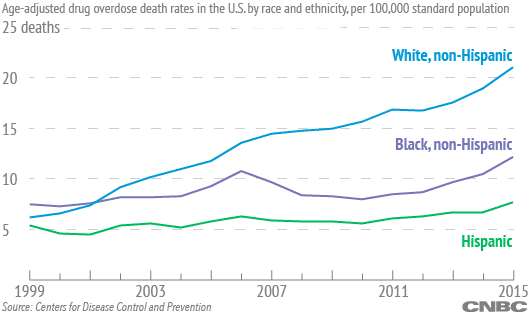
A high metabolic rate amplifies one's confidence in their own inclinations; Dr. Peat calls this one's "internal guidance."I don't understand what you are arguing, or what you think the future of society is,
and what the effect of raising your metabolism has on a person in society, if any
A high metabolic rate amplifies one's confidence in their own inclinations; Dr. Peat calls this one's "internal guidance."
Any artificial replication of intrinsic human orientations interferes with growth and perturbs development.
Bureaucracy in the individual sense, as with the mechanization of labor (and repetitive movements of an assembly line), and also in the political sense with regulations on marriage, familial organization and interactions between human beings all contribute to malaise and eventual suicide.
You should note that Dr. Peat secludes himself to a small town in the Mexican mountains, and he's said that religions such as Mormonism protect us from the surrounding culture. Western culture's entirely toxic, and it will degenerate much further until not a single inch of the planet resists its influence.
Industrial, authoritarian society consumes all alternative lifestyles, and various interests have embedded institutional control upon the parameters of educational inquiry. Youths believe they guide their own learning by asking questions, but professionals (teachers, activists, media personnel, politicians, judges, lawyers, doctors and so on), confident in the virtue of their agendas dissuade any questioning divergent from the cultural narrative. People channel their hatred against their own interests and forge their own chains, all while deluded, instead believing in a striving toward greater freedom and happiness.
True, that's my point. Most revolutions only require a very marginal participation, as in less than a percentage point of the population with support from 10-25% of the remainder.okay
But to be aware of all of those things, would take an enormous amount of thinking and disassociation from society for a while.
Most people never question society
Nice post. I think it would be interesting to look deeper into the initial funding behind early SSRI research, to see if it was merely the work of capitalistic Phizer™ executives or a Government agenda—perhaps even finding proof!—eventually leading to the marketing of social compliance as 'happiness' to millions of television viewers and readers of magazines. Jon Rappoport is always informing us how many suicides these drugs have caused, but this is hard to prove because nearly everyone expects people actually taking SSRIs—the chronically 'depressed people'—are inclined to do such a thing anyway. Regardless, these drugs are bound to produce the brand of psychology no self-respecting person would want. Better would simply be coffee and tobacco, as these two contribute a dopamininergic anti-opiate (caffeoyl quinide) and and a chlolinergic drug (nicotine), respectively, which would be more than helpful for a person attempting to overcome a particular circumstance.
And don't forget about the invention of column chromatography! and even distillation before that which had given humans the solvents needed to extract the most powerful molecules from plants. But I suppose before even that: Fire had given the new ability to smoke both cannabis and opium—being perhaps the first deviation in the route-of-delivery away from oral ingestion. But even smoking opium is hardly fatal (I think there are only a few case reports of this out the millions who'd been addicted to it)—certainly smoking cannabis never is—so it certainly did take some further refinement to concentrate and purify recreational drugs to the point of lethality (and had also allowed the insufflation of cocaine hydrochloride, representing another novel route-of-delivery). I would assume that the chewing of the coca leaf can be addictive, but it certainly will never kill someone (and it could perhaps rightly even be considered 'a habit' instead of 'an addiction'—little different than drinking coffee).